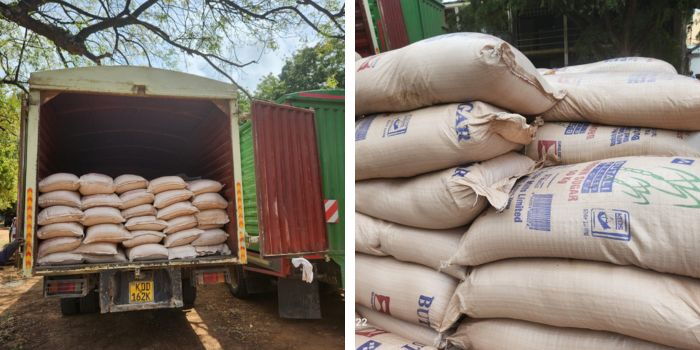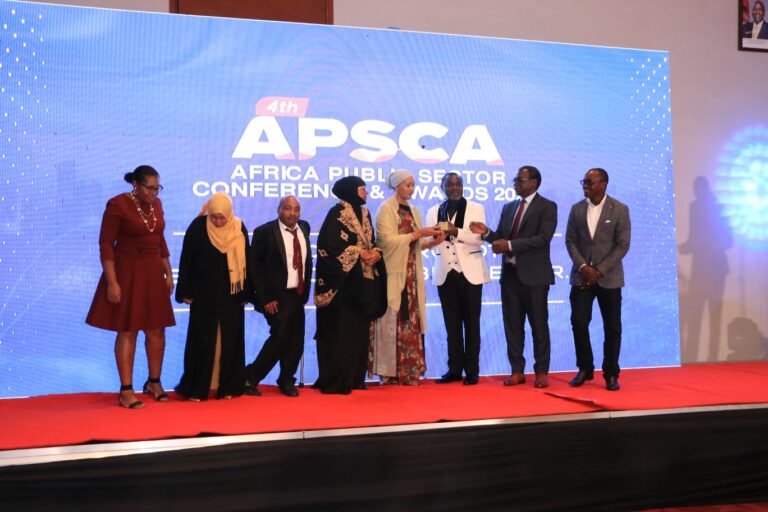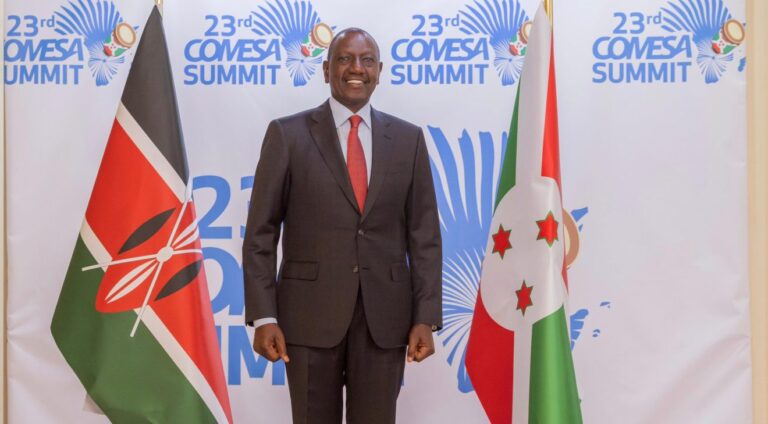
Bags of sugar and jerricans of oil siezed by the anti counterfeit authority on wednesday, august 20. photo/ACA
By Daisy Okiring
The Anti-Counterfeit Authority (ACA) has intercepted counterfeit sugar and cooking oil valued at KSh10 million in a major operation targeting cross-border smuggling from Somalia.
In a statement released on Thursday, August 21, ACA confirmed that its officers, working with a Multi-Agency Team, impounded three lorries at Sabaki Security Patrol Point in Malindi. The trucks were loaded with 676 bags of counterfeit sugar branded “Butali” and other labels, alongside dozens of jerricans of cooking oil. Eight suspects were arrested during the operation and are being held at Malindi Police Station.
Illicit Trade Tied to Terror Financing
According to ACA Executive Director Mbugua Njoroge, the interception was not only crucial in protecting consumers but also in safeguarding the country’s economy and national security. He warned that the smuggling of such products directly undermines Kenya’s revenue collection efforts and risks fueling organized crime and terrorism.
“Smuggling from Somalia does not just erode our tax base. It entrenches illicit trade networks that may fund organized criminal groups and even terror activities. We cannot allow such threats to endanger our people or destabilize our markets,” Njoroge said.
Read More: Older teachers favoured in upcoming TSC promotions
Njoroge stressed that counterfeit food products pose a grave risk to public health. Without proper regulatory checks, consumers could unknowingly purchase harmful goods, exposing themselves to dangerous substances.
“This seizure is about more than just confiscating illegal sugar and oil. It is about protecting Kenyan households from unsafe products while also safeguarding thousands of farmers and workers whose livelihoods depend on the formal sugar industry,” he added.

Growing Threat of Counterfeit Trade
ACA data indicates that counterfeit goods remain one of the biggest threats to Kenya’s economy. The authority estimates that the country loses KSh153 billion annually in potential tax revenue due to counterfeits, while over 40,000 jobs are lost as legitimate businesses struggle to compete.
Globally, the problem is even more severe. The Organisation for Economic Co-operation and Development (OECD) estimates that counterfeit and pirated goods make up 3.3 percent of global trade—equivalent to about USD 509 billion. Similarly, the United Nations Office on Drugs and Crime (UNODC) has repeatedly warned that counterfeit networks are increasingly tied to international crime syndicates and extremist financing.
Njoroge noted that in the past year alone, ACA has seized counterfeit goods worth more than KSh500 million, with over 120 suspects arrested in connection with smuggling and distribution. He vowed that the authority will intensify its crackdown to protect the local economy and shield consumers from harmful products.
Links to Broader Crackdown
The sugar and oil bust in Malindi comes barely a week after the Directorate of Criminal Investigations (DCI) dismantled a separate counterfeiting network in Nairobi. On Monday, August 11, detectives arrested six suspects—four Kenyans, a Congolese national, and a Tanzanian—accused of producing counterfeit U.S. currency.
The suspects were apprehended at a hotel in Ngara following a tip-off. Police recovered 36 bundles of fake U.S. dollars, plastic replicas, black paper resembling banknotes, and other counterfeiting equipment.
Read More: Samidoh officially resigns from Police Service
Authorities say the twin operations underscore the scale of illicit trade in Kenya, ranging from counterfeit consumer goods to fake currency, all of which weaken the economy and expose citizens to exploitation.
Protecting Livelihoods and National Security
Kenya’s sugar sector, already grappling with rising production costs and cheap imports, has been particularly vulnerable to smuggling. Experts warn that unchecked inflows of counterfeit sugar not only undercut local producers but also expose consumers to products of unknown quality and safety standards.
“Every bag of counterfeit sugar sold in our market represents income stolen from Kenyan farmers, factory workers, and legitimate traders. Beyond that, it endangers consumers who have no way of knowing what they are consuming,” Njoroge emphasized.
As the eight suspects await arraignment, ACA has promised to continue working with other agencies—including the Kenya Revenue Authority, the DCI, and customs officials—to dismantle smuggling networks and restore confidence in Kenya’s markets.
“The fight against counterfeits is about defending our economy, protecting our health, and ensuring that criminal enterprises do not use illicit trade to fund violence and instability,” Njoroge said.



